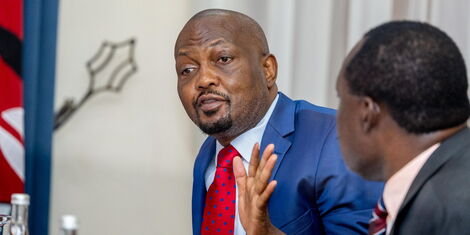Politics
Moses Kuria Predicts There Won’t Be A Presidential Election in 2027

Senior presidential advisor declares Kenya will witness political consensus similar to historic 2002 landslide
President William Ruto’s Senior Economic Advisor Moses Kuria has made a bold prediction that Kenya’s 2027 presidential election will not be a contested affair, but rather a moment of national political consensus similar to the historic 2002 polls that swept Mwai Kibaki to power.
Speaking during an interview on Citizen TV on June 22, Kuria dismissed the notion of a typical presidential campaign, suggesting instead that Kenya’s political landscape is heading toward unprecedented unity among key players.
“Let me shock you,” Kuria declared. “Some people are training for a football match that will not happen. 2027 will be like 2002.
There will be no presidential election — there will be a consensus.”
The 2002 presidential election marked a watershed moment in Kenyan politics when opposition parties united under the National Rainbow Coalition (NARC) to decisively defeat the long-ruling Kenya African National Union (KANU).
Mwai Kibaki secured a commanding 62% of the vote against KANU’s Uhuru Kenyatta, who managed only 31%, ending 24 years of KANU rule.
Kuria emphasized the overwhelming nature of that victory, asking rhetorically: “Have you ever seen that margin again?”
He suggested that just as Kibaki had already gained acceptance among political heavyweights before the 2002 ballot, a similar pre-election consensus is emerging for 2027.
The advisor contrasted this anticipated scenario with the closely contested elections of 2013 and 2017, arguing that current political dynamics favor consensus over confrontation.
“There’s not going to be that kind of presidential contest,” Kuria explained.
“Some people are training for football, but it will be a tennis match.”
Beyond his electoral predictions, Kuria issued a stark warning about Kenya’s political future, urging leaders to prioritize national stability over personal ambitions.
“We have two options: go out one day and destroy the nation, or let’s agree. Let there be honor among men and women,” he stated, suggesting that political consensus could prevent the country from sliding into crisis.
The senior advisor’s comments come amid ongoing political tensions and realignments within Kenya’s political landscape, with various factions positioning themselves for the 2027 race.
Interestingly, while predicting consensus, Kuria also reiterated his own intention to seek the presidency in 2027, claiming to have national appeal beyond his Central Kenya base.
“I can do a rally in any part of this country without the local MP. I’m a villager in every part of the country — Garissa, Wajir, wherever,” he boasted, positioning himself as a candidate with cross-regional support.
Kuria’s predictions have generated significant debate among political observers and the public.
Critics argue that his consensus theory may be wishful thinking, given Kenya’s history of competitive elections and the current political divisions.
Social media reactions have been mixed, with some viewing his statements as an attempt to discourage opposition mobilization, while others see them as genuine political analysis based on his experience in previous electoral cycles.
The 2002 election that Kuria references was indeed unique in Kenya’s democratic history.
The NARC coalition brought together diverse opposition forces, including Kibaki’s Democratic Party, Raila Odinga’s Liberal Democratic Party, and the National Alliance Party of Kenya, creating an unstoppable political force.
However, that coalition eventually fragmented due to disagreements over power-sharing arrangements, raising questions about the sustainability of such broad political alliances.
As Kenya approaches the 2027 election cycle, Kuria’s predictions add another layer of complexity to an already evolving political landscape.
Whether his vision of consensus will materialize remains to be seen, but his statements have certainly injected new talking points into the national political discourse.
The effectiveness of his prediction may ultimately depend on the willingness of Kenya’s political elite to prioritize national unity over individual ambitions — a challenge that has proven difficult in previous election cycles.
Political analysts will be watching closely to see if Kuria’s consensus theory gains traction among other political leaders or if it remains an isolated perspective in Kenya’s characteristically competitive political environment.
Kenya Insights allows guest blogging, if you want to be published on Kenya’s most authoritative and accurate blog, have an expose, news TIPS, story angles, human interest stories, drop us an email on [email protected] or via Telegram
-

 Grapevine2 weeks ago
Grapevine2 weeks agoRussian Man’s Secret Sex Recordings Ignite Fury as Questions Mount Over Consent and Easy Pick-Ups in Nairobi
-

 News1 week ago
News1 week agoTHE FIRM IN THE DOCK: How Kaplan and Stratton Became the Most Scrutinised Law Firm in Kenya
-

 Investigations1 week ago
Investigations1 week agoMulti-Million Dollar Fraud: Three Kenyans Face US Extradition in Massive Cybercrime Conspiracy
-

 Economy1 week ago
Economy1 week agoIran Demands Arrest, Prosecution Of Kenya’s Cup of Joe Director Director Over Sh2.6 Billion Tea Fraud
-

 Business1 week ago
Business1 week agoA Farm in Kenya’s Rift Valley Ignites a National Reckoning With Israeli Investment
-

 Africa2 weeks ago
Africa2 weeks agoFBI Investigates Congresswoman Ilhan Omar’s Husband’s Sh3.8 Billion Businesses in Kenya, Somalia and Dubai
-

 Grapevine5 days ago
Grapevine5 days agoA UN Director Based in Nairobi Was Deep in an Intimate Friendship With Epstein — He Even Sent Her a Sex Toy
-

 News2 weeks ago
News2 weeks agoTragedy As City Hall Hands Corrupt Ghanaian Firm Multimillion Garbage Collection Tender
















